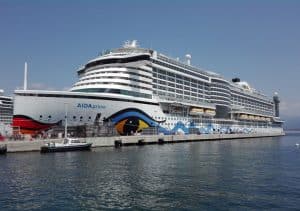
Environmentalists have had the maritime sector in their sights for some time. Cruise liners in particular emit large amounts of pollutants on route to the world’s natural – sometimes seemingly untouched – landscapes, or their diesel generators are running to power onboard systems while they are docked. However, now that shipping companies are switching to LNG, the market could see a change for the better. Fuel cells, too, could soon play an important part in the design of cleaner marine propulsion.
Even though the industry was clearly aware that its strong reliance on diesel generators would need to come to an end someday, it showed little willingness to entertain alternatives. Now, after several years of discussing the pros and cons of liquified natural gas use, the ultracold fuel has become part of a broader push for reducing the emissions from large watercraft. Probably the most prominent example of this shift in attitude is the AIDAnova cruise liner. This LNG-only vessel was christened at Meyer Werft in Papenburg, Germany, on Aug. 31, 2018.
When German environmental association NABU published its yearly list of the cleanest cruise liners last August, AIDAnova was the only ship to be given four green screw propellers and a (limited) recommendation. The chief executive of NOW, Klaus Bonhoff, said about the changes at the top of NABU’s rankings that “ships powered by renewably sourced liquid fuels, such as LNG, are especially suitable for longer trips that require lots of energy.” At that time, all other cruise liners were still using heavy fuel oil. This type of bunker fuel is cheap but extremely damaging to the environment, which explains why those vessels had been rated much worse.
With the construction of AIDAprima and AIDAperla in 2011, AIDA Cruises became one of the first cruise lines to use LNG to power its ships. They both have dual-fuel engines that can run on the liquid while docked, provided that it is available on-site.
But LNG is not “the panacea for the shipping industry’s problems, since it too is a fossil fuel,” NABU stated and pointed to a recent study by Transport & Environment. It added that “the benefits of replacing diesel with LNG to protect the climate are negligible at best.”
The AIDAnova cruise ship is the grey one among the black sheep in the family.
NABU transportation expert Dietmar Oeliger, as quoted by ndr.de
Environmental rules narrow the path
Similar to what is happening with land-based transportation, there have been years-long efforts to clean up the maritime sector. For example, a decision has been made to allow only fuels that contain 0.5 percent of sulfur or less worldwide starting in 2020. Additionally, the EU is planning to lower the limit from 3.5 percent today to 0.1 percent, the current threshold across Sulfur Emission Control Areas, such as the North and the Baltic Sea. When years ago, ever-stricter targets were driving up the cost of cleaning the exhaust from ships powered by the tar-like sludge known as heavy fuel oil, ship operators likewise began looking for alternatives. That was when LNG started to gain traction.
In comparison to diesel, natural gas requires a relatively large amount of energy to be cooled to below -160 °C, condensed into a liquid and stored aboard a ship. But when it is converted back to gas and burned, it produces 90 percent lower nitrogen oxide and 20 percent lower carbon dioxide emissions. It also cuts particulate matter emissions by around 98 percent and all the sulfur is removed during liquefaction. And yet, like the chicken-and-egg dilemma the fuel cell industry has been faced with on land, there are comparatively few ports offering LNG fueling.
“Upgrading a vessel carrying 1,400 twenty-foot equivalent units of cargo to run on LNG could offset the annual carbon dioxide emissions of 1,500 and the nitrogen oxide emissions of 500,000 diesel-driven passenger cars.”
NOW
ZES symposium in Hamburg
On Sept. 4, 2018, NOW, the organization in charge of implementing the German government’s transportation and fuel strategy, held a Zero Emission Shipping symposium at SMM, an international maritime industry show, in Hamburg to update attendees on recent developments in the market. As in 2016, roughly 150 people came to the event to discuss low-emission alternatives to conventional ship fuels.
…
read the whole article in the e-journal
see also: Fuel Cell Watercraft

























reducing pollution by a percentage is NOT the solution when it is available, proven and safe to go to ZERO pollution.
We need ZERO pollution and “reducing” is NOT acceptable.